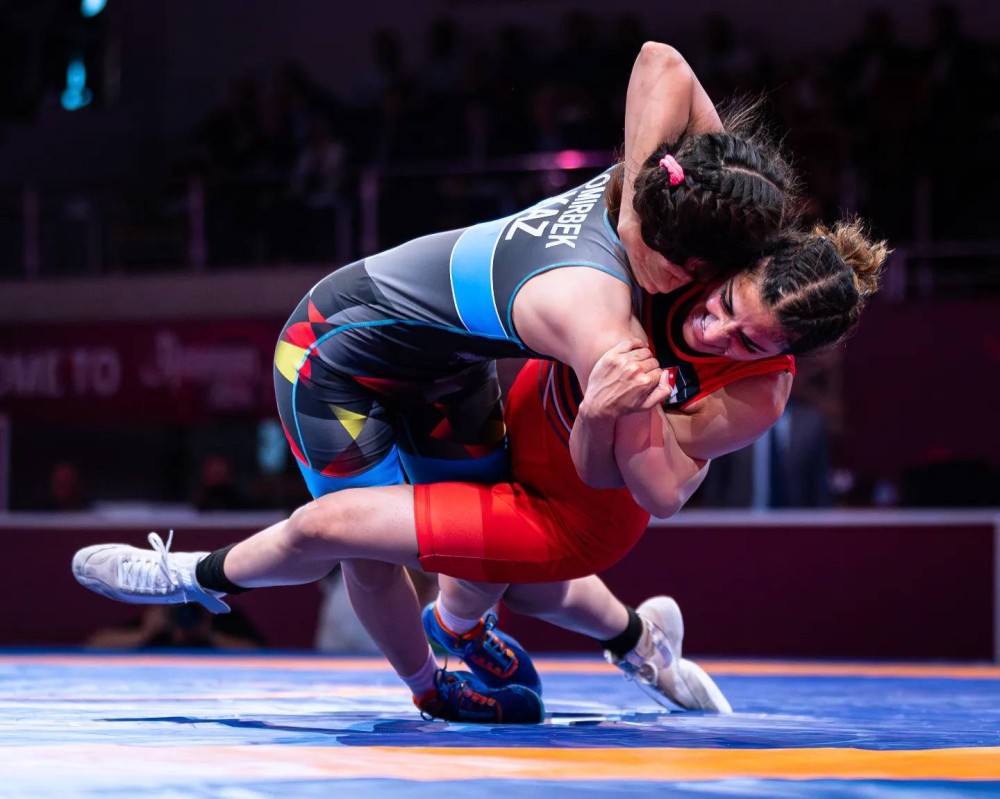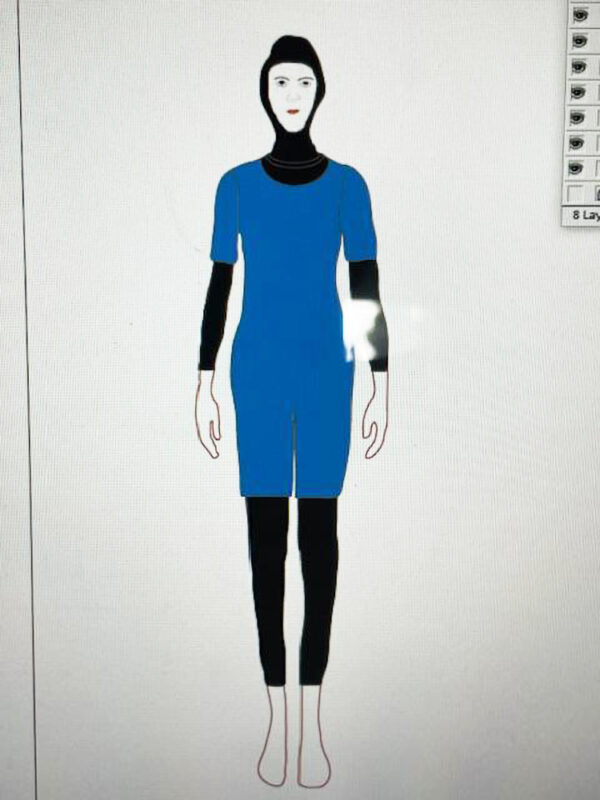Iranian American wrestling champion leads effort to develop singlet for conservative Muslim women

Jordan national women's team member Balqis Cail Taaibin, in red, wrestles Kazakhstan's Shugyla Omirbek during the U23 Asian Championships in Amman, Jordan, in June. (Photo courtesy of Jordan Wrestling Federation)
On a trip to Jordan in February, Afsoon Roshanzamir Johnston, the first woman from the United States to medal at the world championships in freestyle wrestling, met and coached a team of young Jordanian female wrestlers, some of whom have to decide between competing and violating their religious commitment to cover their heads and shoulders in public.
One young woman, she recalls, set her on a quest to change that.
“I saw myself in her,” said Roshanzamir Johnston. “She loves the sport of wrestling and I wanted to provide the opportunity for her and others in the world.”
On her return to the US, Roshanzamir Johnston assembled a committee of designers and manufacturers to come up with a proposed uniform that meets the requirements of the organizations that govern wrestling competitions internationally, as well as those of observant Muslim women.
Any design would have to achieve two basic goals to get past regulators at United World Wrestling, in Switzerland.
“The gear had to be tight” so as not to allow a finger of the opposing wrestler to be caught in looser fitting cloth, said Roshanzamir Johnston. At the same time, it was crucial that there not be multiple layers of loose fabric to cause slippage, allowing the covered wrestler an advantage in working out of wrestling holds.
Working with Tim Pane, CEO of MyHouse Sports Gear, a Scranton, Pennsylvania, company that makes conventional women’s wrestling singlets, and former clothing designer Melissa Veselovsky and Usman Shahbaz, My House’s head of manufacture in Pakistan, Roshanzamir Johnston soon produced a prototype, which she calls Cultural Religious Compliance Gear.
Mohammed Awamleh, head of the Jordan Wrestling Federation, said in an interview that the Arab Wrestling Federation is hoping to be able to present a final version of the singlet in August, when the under-17 world championships will be held in Amman, and that some women might practice in one of the three draft versions that have been created.
The effort is being supported by USA Wrestling as well. “USA Wrestling is proud and honored to work alongside such a strong wrestling ambassador as Afsoon Johnston on purpose of making our sport accessible to all,” said Rich Bender, the organization’s executive director, in a statement.

A computer image of the Cultural Religious Compliance Gear women's wrestling uniform prototype. (Courtesy image)
Roshanzamir Johnston was born in Iran, where her father, the Iranian wrestler Manu Roshanzamir, taught her the moves she was not allowed to even watch under the Islamic Republic’s modesty rules. After the family fled the repressive regime in 1983, she joined the wrestling team at her high school in San Jose, California. She was a member of the first women’s team to wrestle internationally, at the 1989 World Championships, taking home a bronze. The next year, she won silver.
By the time women’s wrestling became an Olympic sport, in 2000, she had retired, but she has stayed involved in the sport. (She coached the USA women in the 2016 Olympics in Rio de Janeiro.)
Her February visit to Jordan, in the company of other past US champions, was aimed at kickstarting interest in women’s wrestling in the Arab region and was the result of hard work by Dan Russell, executive director of Wrestling for Peace. Russell, who lives in Amman, said wrestling provides tools to help navigate life’s larger challenges, for both girls and boys.
“We believe everyone should have the opportunity to learn and grow through wrestling,” said Russell. “Our project is dedicated to supporting the inclusion of appropriate clothing and covering options which adhere to cultural and religious values, enabling more girls to participate in the sport.”
The Jordan Wrestling Federation honored Russell at the close of the 2024 Asian championships on June 30 for his work in helping find solutions to the inclusion of women in world wrestling.
Wrestling for women has been burgeoning in Jordan, whose King Abdullah was also a high school wrestler. The country’s wrestling federation, which had been dormant for 15 years, reestablished a national team for girls and women in 2022, providing the opportunity for them to participate in local and international competitions.
Awamleh said that since then the number of female wrestlers in Jordan has increased to almost 40, including the 10 women on the national wrestling team.
If the new singlet is successful, it will be the second time Jordan has been behind a sports breakthrough for Muslim women. In May 2012, at the inaugural Muslim Women’s Sport Foundation Ambassador Awards in London, FIFA, the world soccer federation, honored Jordan’s Prince Ali Bin Al Hussein for his efforts to overturn the sport’s ban on the Islamic headgear. —Religion News Service





